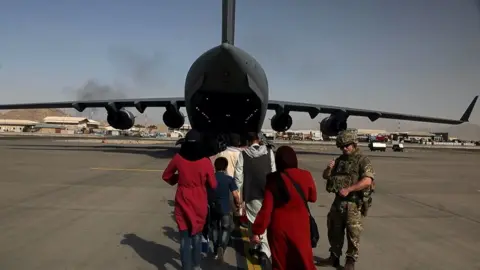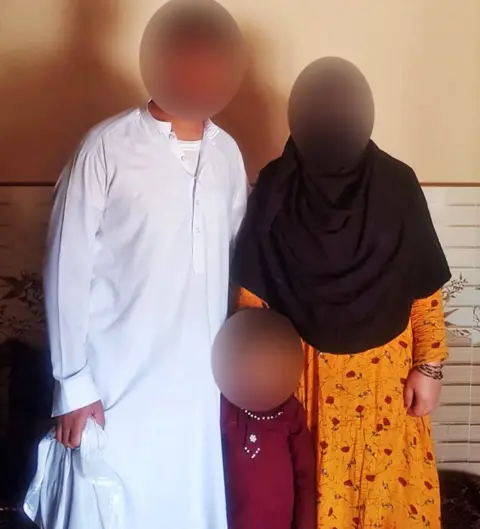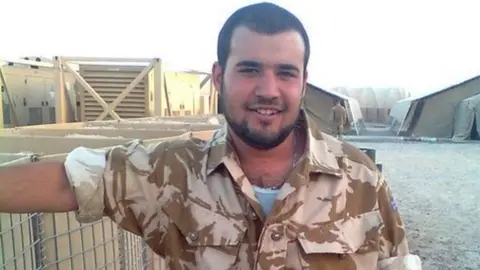Afghanistan: 'I feel betrayed. We feel left behind'
 Reuters
ReutersUK nationals and former interpreters stranded after British forces pulled out of Afghanistan have told the BBC they feel abandoned. Now hundreds are fearing for their safety following a UK government data breach.
Ahmad, not his real name, is in hiding in Afghanistan. He is one of more than 250 Afghan interpreters and local staff whose names and some profile pictures were mistakenly shared in a Ministry of Defence data breach.
He is eligible for relocation under the UK government's Afghan Relocation and Assistance Policy (Arap) but he is still in the country.
When Ahmad received the MoD email he says he initially "felt good". "I thought, they're still chasing our cases."
Then he realised the error. The email addresses and names of all the recipients could be seen by everyone on the email. Many of those who got the email, like Ahmad, remain in hiding, fearful their lives could be in danger.
The government has apologised to those affected and an investigation has been launched. But Ahmad says the error could put him in danger.
"I'm sure that it will have a negative impact on our safety", he says. "We are already displaced from our home town."
Ahmad was shot by the Taliban while on patrol as an interpreter with British troops in Helmand, in 2011.
Before the airport in Kabul closed last month, officials told him to take his family there to be evacuated. But the crush to get on flights was too much for his baby daughter.
Left behind in Kabul, he now lives apart from his wife and child to try to keep them from danger. "I feel betrayed and we feel left behind," he says. "We were the people deserving to be relocated."
"I am living from place-to-place, going door-to-door. It is very difficult for me financially and from the security perspective - and also mentally."
"Just when you think it can't get worse than this, along comes [the email]," he told the BBC.
Abandoned Brits
Since mid-August, when the Afghan government fell, the UK says more than 15,000 people have been evacuated from Afghanistan.
The BBC understands this includes more than 8,000 UK nationals, while a few hundred more have made it out under their own steam. Two flights out of Kabul to Doha in the past week have carried a further 26 British nationals and four Afghan spouses.
Officials will not say how many British citizens have still to make it out of the country but chat among the community left behind in Afghanistan gives a sense of the scale of the problem facing Liz Truss, the UK's new foreign secretary.

"There are loads of people waiting," says Ziad, who travelled from Newport to Afghanistan in July to visit his sick mother. His name has been changed to protect his identity.
"My cousin is also a British citizen, he's also waiting. Lots of my school mates are here as well. My driving instructor, he's stuck here as well. So imagine how many more would be here."
The government says it has advised against travel to Afghanistan for many years. But those who did make the trip and are now stuck feel abandoned.
"They are not serious about their citizens," Ziad says. "Until now, I did not receive any help." He is not alone.
Earlier this month, BBC News reported on a seven-month-old baby left behind in Afghanistan because of a delay in processing her passport.
Three weeks later, her family in London say they are still waiting for news about what can be done to help them.
Zahra, not her real name, told the BBC about her fears for her family in Afghanistan whose details she had registered with the UK government for assistance. She says they still have not had any good news. Her family is now making plans to travel to a third country.
Sayyid, also not his real name, said he was worried about his brother who had previously worked for a British charity in Afghanistan because he had been threatened by the Taliban.
This week he updated the BBC to say that his brother remained in hiding.
Stuck in Dubai
Mujeeb Ashraf, a former interpreter for UK forces, might appear to be one of the lucky ones.
After getting confirmation he was eligible for relocation under Arap, he managed to get himself on a commercial flight out of Kabul before the airport closed. He took the flight rather than wait for the UK to evacuate him.
Now in Dubai, Mujeeb has sent repeated pleas to officials about what to do next but says he has so far not had any information about relocation to the UK.

"It seems they have no plan for third countries," he says. "Every day I'm checking my email to have some good news from the UK government. I don't know what to do next and I have no idea where to go."
With only handouts from voluntary groups to get by, and having to pay around £300 a month in rent to share a small house with 21 people, Mujeeb fears for what will happen after his visa expires.
He pleaded with the UK government to "help those people who helped you in your operations".
The BBC asked the government how it intended to help evacuate people like Mujeeb who are stranded in third countries.
A spokesperson said they could not comment on individual cases but work was under way to support the logistics of relocation of those accepted as eligible who are already in third countries.
Where possible, the government would contact those identified for relocation who are not yet in the UK, the spokesperson added.
A government spokesperson said: "The UK's evacuation operation helped over 15,000 people to safety including British nationals, Afghan interpreters, and other vulnerable people.
"Whilst the success of that operation exceeded our assumptions, we know that there are many left in difficult circumstances."
The spokesperson said the government's "utmost priority is to continue to work with allies and partners in the region to ensure safe passage for those who want to leave Afghanistan".
Additional reporting by Chris Bell

Are you a UK national in Afghanistan or eligible for relocation to the UK and unable to leave? Share your experiences by emailing [email protected].
Please include a contact number if you are willing to speak to a BBC journalist. You can also get in touch in the following ways:
- WhatsApp: +44 7756 165803
- Tweet: @BBC_HaveYourSay
- Upload pictures or video
- Please read our terms & conditions and privacy policy
If you are reading this page and can't see the form you will need to visit the mobile version of the BBC website to submit your question or comment or you can email us at [email protected]. Please include your name, age and location with any submission.
